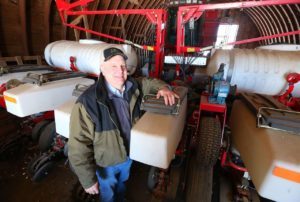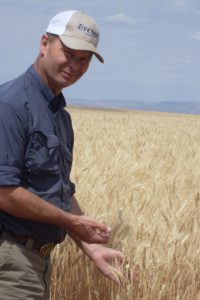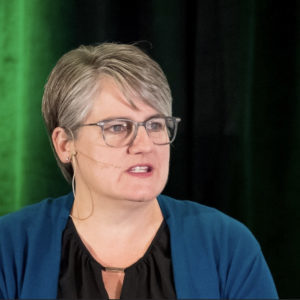Michele Payn's Blog, page 5
September 1, 2020
Why isn’t food raised the way it used to be? Episode 58
Social media memes and marketing messages often ring nostalgic for how things used to be on the farm. But were the “good old days” really better? In this episode we chat with fruit and vegetable expert Gene McAvoy about how farming used to work (and how it still works in some parts of the world) and how research has made farming better.
Gene McAvoy is currently the Associate Director for Stakeholder Relations at the University of Florida Southwest Florida Research and Education Center and previously served with UF IFAS Extension as regional specialized vegetable extension agent in SW Florida for 23 years. He has over 50 years experience in vegetable production in New Jersey, West Africa, South Africa and the Caribbean and most recently Florida. He is currently president of the National Association of County Agricultural Agents.
Key points:
What does an agricultural agent do?
Agricultural or extension agents act as go betweens bringing research information from land grant universities to the people who need it.
How has agriculture changed?
In the past farmers were barely feeding themselves – sustenance farming. Today a single farm supports 250 people. Florida grows food for 150 million people. ,
How has COVID19 impacted Florida agriculture?
A single town in Florida produces 16 million pounds of produce per week during harvest. During the early months of COVID Florida had to destroy 60 million pounds of produce per week.
As much food as possible was donated to charity, but difficulties in transportation and produce that perishes quickly made it challenging.
Crops had to be destroyed instead of harvested to keep them from becoming a breeding ground for pests.
It costs $16,000 per acre to bring a crop to market. Florida experienced a 1/2 billion dollar loss in 6 weeks in Spring 2020.
Florida agriculture is starting to recover.
How has traveling the world influenced your view of farming?
In places like the Caribbean it is expensive to import food. Growing food locally for residents and tourists increases income for the farmers and decreases expenses for local governments.
In Africa a simple school garden can prevent children from going blind by supplying food rich in vitamin A. Teaching simple practices impacts an entire community.
Three tips to overcome Food Bullying:
Educate yourself. Not everything on Facebook is true.
Any fruit or vegetable is better than none. Produce is good for agriculture and good for you.
Don’t buy into claims that pit one type of agriculture against another.
 Links:
Links:
Gene McAvoy website: https://swfrec.ifas.ufl.edu/
Facebook: https://www.facebook.com/gene.mcavoy or https://www.facebook.com/South-Florida-Vegetable-Grower-149291468443385/
Twitter: https://twitter.com/SWFLVegMan
Food Bullying with Michele Payn: http://foodbullying.com
Embrace Your Heart with Eliz Greene: http://www.embraceyourheart.com/
Food Bullying Podcast’s Facebook Page: https://www.facebook.com/foodbullyingpodcast
The post Why isn't food raised the way it used to be? Episode 58 first appeared on Cause Matters.
August 25, 2020
What’s the context of your nutrition choices? Episode 57
Have you ever had an authority figure make you feel bad about your food choices? Are you drawn in by people selling sensation rather than by facts around food? We talk peanut allergies, low-FODMAP diet, health literacy, and why you can eat a pound of chocolate if you really want it (but maybe that isn’t the best idea in the end) with our guest Sherry Coleman Collins.
Sherry is an award winning Registered Dietitian Nutritionist who is passionate about making the delicious choice the healthy choice and converting the science of nutrition into bite-size nuggets for consumers and professionals. She’s a writer, a speaker, a social media savvy recipe developer, podcaster and lover of good food.
Key points:
Context is important:
Choose what is right for you in the context of: What you like: you can eat any thing any time, just not every thing all of the time.
You need to know:
Your nutritional goals
Allergies and sensitivity
Long-term health
How to sort through information provided by “authorities”:
Just because someone is trained as a health provider/chiropractor/etc, it doesn’t mean they have nutrition training based in science.
Most of us aren’t health or science literate so we have to check the source of our information:
Is the person an actual authority in science-based nutrition or are they selling sensation?
Is the information based in science, or does it jut sound “sciency”?
Is the website of the source an academy or journal of science or is it a website selling supplements, tonics, diets, or books?
Nutrition science isn’t “sexy.”
The answer is always balance and moderation, but that is hard for people
Moderation is subjective and people want specifics
Sensationalism is sexy (probably a big clue about the quality of information)
More facts equal more enjoyment of food.
Navigating allergies and food sensitivities:
Work with a registered dietitian
Focus on food naturally free of what you need to avoid
provide a list of what you CAN eat
have a conversation in advance with those providing food (school, college, work, etc)
the AND covers food allergies and sensitivities
Peanut allergies are misunderstood:
We believe peanut allergies are more prevalent than they are:
1% of adults
Up to 2% of children
People are fearful about being around allergens
touching and airborne exposure doesn’t create life-threatening reactions
need to provide education for staff and classmates about good hygiene to prevent cross contamination
banning peanuts from an environment can create a false sense of security.
Three tips to overcome Food Bullying:
Know what you believe and why.
No is a complete sentence.
Say what you mean, but don’t say it mean.
 Links:
Links:
Sherry Coleman Collins website: SouthernFriedNutrition.com
Facebook: facebook.com/dietitiansherry
Instagram: instagram.com/dietitiansherry
Twitter: twitter.com/dietitiansherry
Food Bullying with Michele Payn: http://foodbullying.com
Embrace Your Heart with Eliz Greene: http://www.embraceyourheart.com/
Food Bullying Podcast’s Facebook Page: https://www.facebook.com/foodbullyingpodcast
The post What's the context of your nutrition choices? Episode 57 first appeared on Cause Matters.
August 18, 2020
The family business struggles of agriculture: Episode 56
Do you know a farm family? The vast majority of agriculture businesses are family-owned. Our guest, Jolene Brown, consults with hundreds of farm families each year and shares the stresses and delights of farming.
Jolene Brown is a real “Farmer Brown.” From Eastern Iowa, she’s an internationally known professional speaker in agriculture. Jolene is a long-time friend of Michele and Eliz, who can attest that Jolene is fun and funny, insightful, and authentic in her presentations. Her consultations in family business earned her the reputation as the “Dr. Phil of Agriculture.” In this episode, she’s shares experience, insight, and tools to help make a good family business even better.
Key points:
People in agriculture live in uncertainty all of the time:
Weather, global markets, government pressures
Farm families learn to be resilient
Farmers critical to the economy of rural communities
COVID-19 has added more uncertainty
Significant economic and mental health impact
Working 24 hours per day and still being in the red
Not making a profit on products – Food had been dumped rather than sold
Trade being questionable
When uncertainty increases, people look for something to control
Suicides have increased in Ag
Farmers are handing on to assets and delaying decisions about succession
Senior generations need to feel financially secure before handing over the reins
Family farm businesses are complicated
95 – 98% of all agriculture businesses are family-owned but incorporated to address liability, asset protection, and tax issues
Farmers are good people who want to do what’s right
Farmers are dedicated to providing safe, abundant, and compensated food to the world
Farming gives us national security
Gratitude goes a long way
Three tips to overcome food bullying:
Know yourself and what you are willing to do
Have good resources, be a good neighbor and check in with farm families
Be a student and listen
Links:
Jolene Brown website: jolenebrown.com
Facebook: facebook.com/jolene.brown.cspcpae
Twitter: twitter.com/jolenebrowncsp
Food Bullying with Michele Payn: http://foodbullying.com
Embrace Your Heart with Eliz Greene: http://www.embraceyourheart.com/
Food Bullying Podcast’s Facebook Page: https://www.facebook.com/foodbullyingpodcast
August 11, 2020
Roundup, dorm diets, and chemicals: Episode 55
In this special behind-the-scenes episode, Michele and Eliz welcome Callie (Eliz’s daughter and manager of the Food Bullying Facebook Page) for a wide-ranging Q&A session. Callie Greene is about to begin her second year at Lawrence University, where she studies psychology and harp performance.
Callie’s Questions:
What’s with all the Roundup in hummus and cereal?
Roundup kills weeds and has been used and tested for many years
Farmers treat the fields to kill weeds to protect the crop plant
Weeds in chickpea field will cause mold after harvest
If weed seeds get into harvest, the chickpeas the farmers can’t sell it
Roundup like the sun is a carcinogen. The dose (or exposure) matters
The EPA has stringent guidelines for residue measured in mg/kg/day
A person would have to eat 36 Kg of breakfast cereal per day to be harmful.
The Environmental Working Group is not a research group; they use their own, non-science-based measurement as a scare tactic.
Farmers don’t dump chemicals on to their land
Time-consuming and expensive
Soil is the most important asset
Your food is safe. Check the source of information for facts.
What can we do to eat better when we are eating dorm food?
There is room for all foods in your diet.
Choose colorful foods
Talk to the foodservice manager and ask for what you want
Pay attention to how you feel after eating. Experiment with combinations of proteins, grains, and produce.
Why is there so much blame and fear about agriculture and the environment?
People working with the land care deeply about the land
People are disconnected from the farm and get misleading information about what happens on the farm
Ag is responsible for 9% of greenhouse gasses
Electricity of the U.S. is responsible for 7 times the impact of Ag
COVID19 drastically improved the air quality around the world – but there are the same number of animals.
The FAO’s Livestock’s Long Shadow study exagerated figures on the environmental impact of agriculture, and has been corrected by the author. The damage to ag’s reputation hasn’t been corrected.
The study created distrust and fear.
Ads like the recent Burger King ad continue to spread misinformation
There is always room to do better, that’s called progress
Ag is always trying to reduce environmental impact.
GMOs are part of that effort.
People may feel that changing their eating habits is something they can do to individually impact the environment:
Check the sources of the information.
Make choices based on your own standards
Farmers deserve choice on how they farm, too.
Links:
Food Bullying Podcast’s Facebook Page: https://www.facebook.com/foodbullyingpodcast
Embrace Your Heart with Eliz Greene: http://www.embraceyourheart.com/
Food Bullying: How to Avoid Michele Payn: http://foodbullying.com
August 4, 2020
Feeding kids with confidence: Episode 54
Food shaming puts undue stress on parents, especially as kids go back to school. Our guest, Amy Reed, is a pediatric dietitian who teaching parents how to advocate for the needs of their kids. Whether your child is labeled as a “picky eater” or has significant challenges receiving nutrition, parents who aren’t confident in what they feed their kids are susceptible to food shaming and bullying.
As a pediatric dietitian, Amy evaluates how well a child is growing and how their nutritional status is helping or hurting their growth. She works with kids with a wide range of eating issues and reminds us that eating is a learned skill. Each child develops the skill at their own pace. Amy encourages parents to feed their kids with confidence, they know their child run best.
Key Points:
All foods have their place. Stay away from fads that eliminate food groups.
One thing is constant: fruits and veggies are important.
Look for information from credible sources:
Professionals with training and credentials https://www.eatright.org/find-an-expert
NIH Nutrition Resources https://www.nhlbi.nih.gov/health/educational/wecan/eat-right/index.htm
HealthyChildren.org https://healthychildren.org/English/P...
Talk to a registered dietitian
Eating is a skill. What may look like a picky eater could be a child who is developing at a different pace.
Parents of children with feeding issues often blame themselves and feel blamed by others.
Many parents feel guilty because they aren’t sure what to feed their kids. Lack of confidence make them vulnerable to misinformation.
Parents should rely on good quality information rather than fads or marketing, especially during the pandemic.
Family events can be very stressful for parent dealing with feeding issues.
Don’t buy into “in my day kids ate what was put in front of them” guilt.
Bring something along just in case.
If you are hosting, ask about what the kids can eat.
Have a go-to response, “I appreciate your concern. We are working with professionals and have a plan.”
Remember it is only one meal. If all the kid can eat is the cake, it doesn’t make you a bad parent.
Links:
Amy Reed
https://www.amyreednutrition.com/blog/2018/03/06/lets-talk-gmos-part-1
https://www.amyreednutrition.com/blog/2018/03/08/lets-talk-gmos-part-2
https://cincinnati.momcollective.com/food-shaming/
https://www.amyreednutrition.com/blog/2018/4/23/how-to-be-supportive-of-a-family-with-a-picky-eater
Have you liked the Food Bullying Podcast’s Facebook page?
Food Bullying: How to Avoid Buying BS by Michele Payn
Embrace Your Heart with Eliz Greene
July 28, 2020
Cooking, culinary medicine, & comfort in nutrition: Episode 53
Did you know there is a science dedicated to teaching cooking skills? How and what we serve at our table makes a big difference in our health. Our guest shares why she teaches medical students about nutrition.
Dr. Jacque Nyenhuis is a chef, dietitian, professor of medicine, and farms on the side. She started working in restaurant kitchens when she was 16 and moved up from dishwasher through just about every position in culinary. She has spent several decades teaching and mentoring medical doctors, chefs, medical students and families how to move towards better health through simple cooking and sharing of meals. Jacque co-authored a nutrition textbook used in Universities across the country and several cookbooks. She had her own television cooking show, radio show, syndicated nutrition column that ran in newspapers throughout the US and Canada, a monthly food and nutrition column for Saturday Evening Post and currently teaches nutrition and is director of the Culinary Medicine Lab at the University of Central Florida College of Medicine in Orlando, Florida.
Key points:
What is culinary medicine?
It’s about how food can move us toward better health
Evidence-based science of teaching cooking skills
Help people to develop skills for better health
Teach medical students so they have tools to use with patients
There are significant barriers to putting a healthy meal on the table:
It is stressful when you are busy
Talked with women around the US and internationally about what makes it hard:
Time
Financial pressures
Pickiness (don’t eat some foods)
People choose nutrition interventions along political party lines:
Should government be involved in the solutions or not
Is fast food to blame
Lots of noise about what we should choose
Being bullied is embarrassing
Questions can feel like bullying
Two of top 3 items that people have a belief not supported by science are food items.
How to give medical students better tools:
Medical students and physicians love the class
They have to put aside personal ideology and talk to the patient about health
It can be hard for younger professionals to give advice when they may not be cooking for themselves
Need to find simple ways to eat at home
76% of doctors felt they didn’t get enough information about nutrition in med school
More than half were not comfortable talking about fad diets and nutrition
Doctors want more information
Doctors are overwhelmed with information
Helping families develop good eating habits to improve health is important:
Don’t have to change every habit
Creating a meal-time habit including:
Plates
Serving multiple food groups
Sitting down
Cutting out constant snacking all day long
 Three tips to overcome Food Bullying:
Three tips to overcome Food Bullying:
Show grace for the person who is bullying me
Show grace to myself in my response to food bullying
Kindly and gently set the record straight
Links:
Jacque Nyenhuis website: www.cookingwithjacque.com
Facebook: https://www.facebook.com/cookingwithjaqcue/
Instagram: @cookingwithjacque
Have you liked the Food Bullying Podcast’s Facebook page?
Food Bullying: How to Avoid Buying BS by Michele Payn
Embrace Your Heart with Eliz Greene
July 21, 2020
Chemicals, creepy crawlies and crops: how safe is your food? Episode 52
Agronomist Kevin Hoyer joins the podcast to talk about his experience helping farmers diagnose and treat their plants and soil as well at traveling the world looking at food production in other countries. As a “doctor for crops,” he says “you can be thankful and trust that the product you buy are at the highest level of safety possible. America carries the highest standards found anywhere in the world.”
Kevin Hoyer and his wife Jody own and operate a family farm nestled in the bluffs of west central Wisconsin, not far off the Mississippi River. They grow soybeans, corn along with small grains to use as cover crops. They both also work off the farm, Jody as a quality control specialist for a local dairy processor, while Kevin works as an agronomist and crop advisor at a local ag retailer.
Key points:
An agronomist is like a doctor for crops
trained in plant and soil health.
focused on safe and abundant food that is as sustainable and environmentally-friendly as possible.
works directly with farmers.
soil tests
plant health analysis
advising farmers
Why do farmers use chemicals?
the chemicals are plant-protectants designed to protect or reduce stress on the crop.
similar to using sunscreen to protect our skin.
like taking an aspirin for a headache.
weeds rob water and nutrients from crops
many compounds used are found in nature in plants or soil
plants have natural pesticidal activity to ward off pests.
alfalfa evolved to grow longer hairs on the stem to ward off aphids.
Why is understanding agriculture in other parts of the world important?
get outside your comfort zone
understand other consumers and their concerns – there are commonalities.
farmers want to grow crops with as little fertilizer or pesticides to maximize production.
consumers want to feel comfortable that food was grown and processed with care an safely.
other countries do things we don’t do anymore.
new practices reduce negative impact.
America has the highest standards for food safety and quality.
Tips to overcome Food Bullying:
Remember all of our food has to go through the same safety standards whether it is labeled sustainable, organic, conventional – they must meet the same levels of quality and safety.
Look out for claims that seem outrageous. Trust that your food is safe.
If you have questions, ask a farmer – we don’t have anything to hide.
 Links:
Links:
Kevin Hoyer Facebook: https://www.facebook.com/Hoyer-Farms-138987533112713/
Food Bullying Podcast’s Facebook Page: https://www.facebook.com/foodbullyingpodcast
Food Bullying: How to Avoid Michele Payn: http://foodbullying.com
Embrace Your Heart with Eliz Greene: http://www.embraceyourheart.com/
July 14, 2020
Should we be afraid of sugar? Episode 51
Sugar gets the blame for many of our health issues. Should we avoid sugar? Are there good sugars and bad sugars? Our guest, Melissa Joy Dobbins is a registered dietitian and diabetes expert. She brings a common sense approach to eating well and says “if people with diabetes can have sugar, you can too!”
Melissa Joy Dobbins MS, RDN, CDE is known as The Guilt-Free RD® – “because food shouldn’t make you feel bad!” As a dietitian and diabetes educator, Melissa helps people digest food and nutrition information so they can make their own well-informed food decisions based on facts, not fear, and ultimately – enjoy their food with health in mind. Melissa hosts the popular Sound Bites® Podcast where she interviews experts on a variety of topics ranging from fad diets to farming and delves into the science, the psychology and the strategies behind good food and nutrition.
Key points
More than 1/3 of Americans are obese. People blame sugar consumption, but we’ve only slightly increased sugar consumption since 1989.
Sugar isn’t the sole problem. Inactivity is an issue, too.
Sugar is a simple carbohydrate
Common sources of sugar are
Sugar cane
Sugar beets
Corn
Honey, table sugar, and high fructose corn syrup all have 16 calories per teaspoon and are nearly identical.
The difference in the source of sugar is less important than the amount consumed.
Doctors don’t always have the facts on sugar.
Should focus on nutrient-rich foods instead of sugar.
Takes shame out of the conversation.
Research shows kids drink more milk if it is flavored. Getting the nutrition is more important. It is like putting a little dressing on salad.
Focus on what is nutrients are in the food and what things in it might you want to avoid.
Doctors have implied power based on their position, but don’t receive training in nutrition. They can unintentionally spread fear about food.
People have to be in the driver’s seat of their own health. There are no forbidden foods – have to pay attention and make a decision about what works best for you.
Dietitians have significant on-going training and specialize in areas such as pediatrics or diabetes. People have to swim in their own lane of expertise.
School lunches and snacks can be a source of food bullying.
Things have changed over time in terms of what is encouraged for snacks at school.
Now required to bring fresh fruit or vegetable for snack
Challenging to avoid food waste if it all has to be fresh instead of apple sauce or raisins
Doesn’t avoid allergy issues
Elitist – not everyone can afford or has access to produce
How to think about sugar:
Look at it from diabetes point of view.
Consider a combination of simple carbohydrates (sugar) and complex carbohydrates
Research doesn’t support sugar creates hyperactivity
Blood sugar doesn’t spike and crash unless you have diabetes or reactive hypoglycemia
Be aware how much sugar is in your food – but don’t be afraid
too many calories from anything will cause weight gain
“hidden sugar” isn’t really an issue
feeds into a conspiracy theory about the food industry tricking us into buying food – look at the label
people buy what tastes good
“added sugar” label is confusing
Snacks should fill nutrient and hunger gaps
look at label to see what nutrients are in the snack
we don’t get enough produce
use all forms of produce to get what we need: Fresh, canned, frozen, and dried.
small cups of apple sauce or fruit are portion controlled
chose based on your own needs and standards
 Three tips to avoid food bullying:
Three tips to avoid food bullying:
Food shouldn’t make you feel bad. If you aren’t feeling good about a food (or are uncertain) step back and think about your goals and standards
Don’t pay attention to the front of the package. Look at the nutrition label.
Focus on nutrient-rich foods.
Links:
Sound Bites Podcast: https://soundbitesrd.com
Melissa on Instagram & Twitter: @melissajoyrd
Food Bullying Podcast’s Facebook Page: https://www.facebook.com/foodbullyingpodcast
Food Bullying: How to Avoid B.S. by Michele Payn: http://foodbullying.com
Embrace Your Heart with Eliz Greene: http://www.embraceyourheart.com/
July 7, 2020
Honoring choices in food and farming: Episode 50
How do we honor the people who produce our food when most of us never set foot on a farm or ranch? Our guest this week suggests the key is educating yourself about the benefits of food and choosing what you want without giving into what other people may think.
Joe Anderson is a fourth generation farmer in Idaho & has been farming probably all his life, but as a career since 1983. Like many farmers, he knew that’s what he wanted to do from an early age. When not farming, he serves his industry as an Idaho Wheat Commissioner, or is out on an adventure somewhere seeking new people and places.
Key questions:
What does a Wheat Commissioner do? They decide how check-off dollars are spent:
Research
Marketing (including international marketing)
Education
What would do you wish people would know about what you do?
It is about more that what happens in the field.
Farmers spend a lot of time educating themselves about what they produce and the market for their products.
Has wheat been modified to have more gluten?
Starches and proteins have not changed in the last 50 years.
Wheat has been selected for yield and baking characteristics.
Wheat production is customer driven. They want a consistent product. Through universities and research create better baking traits.
Gluten is a combination of wheat proteins. It is the active part of what makes bread work.
How is GMO wheat different?
There is no GMO wheat. The label is marketing, not nutritional.
There could be some other GMO ingredients (soy or canola oil for example)
Is the gluten-free label frustrating to you?
Some people need the label to avoid gluten allergy, however many products never contained gluten.
Ham has always been gluten-free.
It is frustrating.
Do you want to go back to the “good old days” of farming?
Equipment now is better e.g. tractors didn’t have cabs to protect from dirt and weather or GPS equipment.
The early days were rather brutal.
Now we have tools to prevent erosion and save top soil (better chemicals help reduce tillage and keep nutrients)
 Links:
Links:
Joe Anderson on Instagram: instagram.com/lewistonjoe
Twitter: twitter.com/beemerjoe
Food Bullying: How to Avoid Michele Payn: http://foodbullying.com
Embrace Your Heart with Eliz Greene: http://www.embraceyourheart.com/
Food Bullying Podcast’s Facebook Page: https://www.facebook.com/foodbullyingpodcast
June 30, 2020
What does it take to farm organically? Episode 49
USDA Certified Organic is more than a label. Our guest, Carolyn Olson, shares the attention to detail and expense necessary to produce an organic crop. She also shares how raising pigs conventionally is part of their plan.
Carolyn Olson is a wife, mom, grandma, and farmer. She is a district director on the Minnesota Farm Bureau board of directors and was the first chair of the American Farm Bureau Organic and Direct Marketing Issue Advisory Committee. She farms with her husband, Jonathan, in southwest Minnesota, and shared her farm story in Food Truths from Farm to Table about how conventional and organic agriculture can work together.
Key points:
It takes 36 months to become a certified organic farm:
There is a ton of record-keeping and paperwork to prove everything is done exactly to organic standards.
In those 36 months. farmers can sell crops in the conventional market, but there are more expenses. They can find new markets for their crops or switch to different crops.
Farmers have to market their own crops and understand who is buying what.
Annual and spot inspections are a big expense and require that what is happening matches exactly with the requirements and plans.
Agriculture has divided themselves into groups, such organic vs. conventional or no-till vs. till. There isn’t one right answer in agriculture – or in food. Everyone chooses what is best for them. For example, raising pigs conventionally provides ample organic fertilizer.
 Tips to overcome Food Bullying:
Tips to overcome Food Bullying:
Remember that no matter what you buy, you are supporting a farmer.
If you have questions about organic, ask an organic farmer. If you have questions about conventional, ask a conventional farmer.
Understand the impact of the disruption of the food chain has on the emotional health of farmers. Come in with compassion.
Links:
Carolyn Olson on Facebook: https://www.facebook.com/carolyncaresblog/
Twitter: @Westacre
Instagram: @Westacre2CJ
Food Bullying: How to Avoid Buying BS by Michele Payn
Embrace Your Heart with Eliz Greene
Have you liked the Food Bullying Podcast’s Facebook page?



